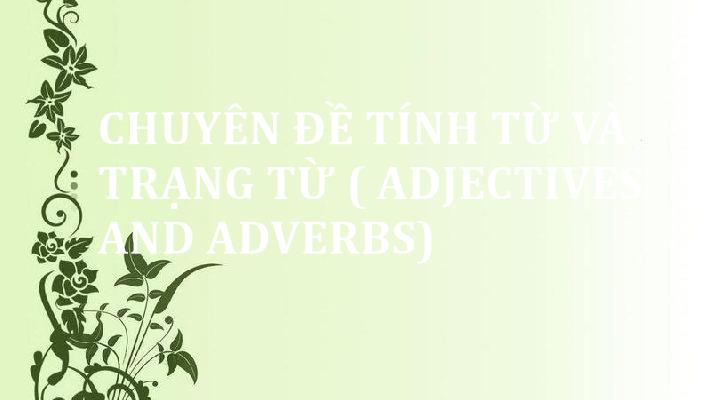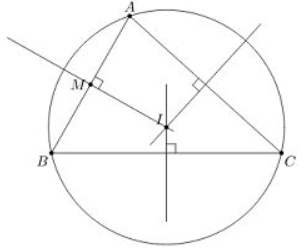Những kiến thức cần nắm vững về trạng từ (Adverb)
A. Định nghĩa:
-Trạng từ (hay còn gọi là phó từ) là từ dùng để bổ nghĩa cho
động từ, tính từ, một trạng từ khác hay cho cả câu. Nói cách khác, trạng từ là
từ được sử dụng để bổ nghĩa cho tất cả các loại từ khác ngoại trừ danh từ và
đại từ.
-
Vị trí của trạng từ:
+ Trước động từ thường (nhất là các trạng từ chỉ tần suất: often, always, usually,
seldom....)
Ex: I usually do my homework after
school.
+ Giữa trợ động từ và động từ thường
Ex: I have recently visited my
grandparents.
+
Trước tính từ: "tobe/feel/look" + adv + adj
Ex: You look really nice in that
dress.
+ Sau “too”: V+ too + adv
Ex: My teacher speaks too quickly.
+ Trước “enough” : V + adv + enough
Ex: My teacher speaks slowly
enough for us to understand.
+ Trong cấu trúc so....that: V + so + adv +
that
Ex: Peter drove so carelessly that
he caused an accident last night.
+ Đứng cuối câu
Ex: The train went slowly.
+ Trạng từ cũng thường đứng một mình ở đầu
câu,hoặc giữa câu và cách các
thành phần khác của câu bằng dấu phẩy(,)
Ex: Unfortunately, I forgot the
key at home
B. Phân loại
1.Trạng từ tình thái (Adverbs of manner)
Những lưu ý:
|
- Trạng từ tình thái diễn
tả cách thức thực hiện một hành động hay cách một - Trạng từ tình thái được
tạo nên bằng cách thêm đuôi –ly vào sau một tính
- Một số từ có chức năng
như một tính hoặc một trạng từ mà không cần thêm
- Một số trạng từ tồn tại
dưới 2 dạng: 1 dạng có -ly và 1 dạng không có –ly. 2
- Một số tính từ kết thúc
bằng -ly như friendly, cowardly,
lively, motherly, sickly,
silly,… Nếu muốn sử dụng chúng như
một trạng từ, ta có thể nói: in |
Bài tập minh họa 1: Điền vào chỗ trống trạng từ thích hợp
a)
He’s a bad
driver. He drives_____
b)
She’s willing to
help. She helps_____
c)
He made a sudden
change of decision. He changed his decision____
d)
It was a heavy
rain. It rained____
e)
The train is
early. It has arrived____
f)
Make your best
effort. Do your____
g)
What a wide door.
Open it____
h)
I get a monthly
bill. I pay____
i)
My name is last.
I come____
j)
I’m a better
player than you. I play____
Bài tập minh họa 2: Chọn trạng từ thích hợp cho mỗi câu sau
a) He has to work very____to support his family.
(hard/hardly)
b) He earns____enough money to pay the bills.
(hard/hardly)
c) He was the one who came____. (last/lastly)
d) ____, I would like to
thank my parents for all their support. (Last/Lastly)
e) I have received a lot of presents____. (late/lately)
f) He arrived so____that I became impatient.
(late/lately)
g) I think you should treat your dog____. (just/justly)
h) I’ve_____been offered a job. (just/justly)
i) I’m sure your family thinks very____of you.
(high/highly)
j) If you want to succeed, you should aim____.
(high/highly)
Bài tập minh họa 3: Chuyển tính từ thành cụm trạng từ
a) That was a cowardly thing to do. You acted____
b) That was a silly thing to do. You acted____
c) The music band gave a lively performance. They
performed____
d) She can’t control her motherly feelings. Even though
he’s 40, she looks after him____
e) She’s a lovely sister. She plays with her brother____
f) He looks pale and sickly. He always greet me____
g) She don’t have to be so unfriendly! You needn’t look
at me____
2. Trạng từ chỉ thời gian (Adverbs of time)
Những lưu ý:
|
- Trạng từ chỉ thời gian
diễn tả thời gian một hành động được thực hiện hay - Trạng từ chỉ thời gian có
thể là mốc thời gian cụ thể: today,
yesterday,
this/next/last week, on Monday,this morning, at 7 o’clock,… - ‘Still’ và ‘yet’: hai
từ này có nghĩa là ‘cho đến hiện tại’ và thường được sử ‘Still’ nhấn mạnh sự tiếp tục của hành
động, sự việc, thường được sử dụng
Ex: Linda still hasn’t written to me. ‘Yet’ được sử dụng chủ yếu trong câu hỏi
và câu phủ định, thường đứng ở Ex: Has your new shirt arrived yet? – No,
not yet. It hasn’t arived yet. - ‘Already’ có ngụ ý rằng hành động đã kết thúc, đã hoàn thành,
được sử
Ex: This machine is already out of date. - Một số trạng từ chỉ thời
gian thường gặp khác: afterwards, at
last, just, lately,
now, once, recently, soon, suddenly, then, these days,… - Trạng từ chỉ thời gian có
thể đứng ở đầu câu hoặc cuối câu |
Bài tập minh họa 4: Viết lại câu thêm ‘still’ hoặc ‘yet’
a)
The boy is at
home.
b)
I haven’t
received your letter.
c)
Has she called
you?
d)
Is Peter in
hospital?
e)
I’m waiting for
my new computer.
Bài tập minh họa 5: Viết lại câu sử dụng ‘yet’ hoặc ‘already’
a)
Have you had
dinner? I’ve had it, thanks.
b)
I haven’t
received an invitation to the party.
c)
I have received
an invitation to the party.
d)
Have you finished
writing?
e)
Haven’t you
finished writing?
3. Cụm trạng từ chỉ khoảng thời gian (Adverbial
phrases of duration)
Những lưu ý:
|
- ‘Since’, ‘for’ và ‘ago’ ‘Since’ + một mốc thời gian: trả lời cho
câu hỏi Từ khi nào?, được sử dụng
Ex: We haven’t seen him since 2016. ‘For’ + một mốc thời gian: trả lời cho câu
hỏi Bao lâu?, nói về khoảng thời Ex: We have known each other for 2 years. Khoảng thời gian + ‘ago’: trả lời cho câu
hỏi Từ bao giờ?, đánh dấu mốc Ex: I started working here 3 months ago - ‘Till’ (hoặc ‘until’ ) và ‘by’: có nghĩa là trước khi, cho đến
khi ‘Till’ hoặc ‘until’ có thể đi với các động
từ: learn, lie, live, rain, sit, sleep, stand, stay, wait, work nhưng ‘by’ lại
không thể đi được với các từ này. Ex: I’ll wait here till 4 o’clock. ‘by’ có thể đi với các từ arrive, come,
finish, go, leave,… Ex: She won’t arrive by 4 o’clock. - ‘During’ và ‘in’ ‘ During’ có nghĩa là ‘từ lúc bắt đầu cho
đến lúc kết thúc’ hoặc ‘vào một thời điểm nào đó trong một khoảng thời
gian’. Ex: We had a lot of fun during the
holidays. ‘in’ có thể sử dụng như ‘for’ khi nói về
thời gian Ex: We had a lot of fun in the holidays. Nhưng không thể sử dụng ‘in’ khi nói về
một hành động hay sự kiện Ex: We watched the film during the
flight. (không viết là ‘in the flight’) |
Bài tập minh họa 6: Thêm ‘since’, ‘for’ hoặc ‘ago’ vào vị trí thích hợp
trong những câu sau:
a)
I saw your
brother a week.
b)
I started writing
for this magazine 2 years.
c)
I saw her last
month and haven’t seen her.
d)
How long did you
become a singer?
e)
I haven’t been
home 2000.
f)
They lived here
10 years before moving.
g)
We’ve been best
friends 5 years.
h)
When have you
joined the music club?
Bài tập minh họa 7:Điền ‘by’ hoặc ‘till’ vào chỗ trống
a)
I’ll
wait____Friday before phoning him.
b)
I intend to stay
at home_____9 o’clock tomorrow morning.
c)
Your dress will
be ready____Sunday.
d)
Your dress won’t
be ready_____Sunday. You can collect it next Monday.
e)
Your dress won’t
be ready_____Sunday. You can collect it then.
f)
I’m sure I will
have left_____Monday.
Bài tập minh họa 8:Điền ‘in’, ‘during’ hoặc ‘for’
a)
It was very
cold_____November.
b)
I was sent
abroad_____my military service.
c)
It rained_____the
night.
d)
I’ll see
you_____the lunch hour.
e)
I woke up
twice_____the night.
f)
Can you hold your
breath____one minute.
4. Trạng từ chỉ tần suất (Adverbs of frequency)
Những lưu ý:
|
- Trạng từ chỉ tần suất diễn tả mức độ thường xuyên của một
hành động, dùng để trả lời câu hỏi How
often? Những trạng từ chỉ tần suất thường gặp:
- Trong câu khẳng định, trạng từ chỉ tần suất có thể đứng ở 1 trong 3
vị trí + Sau ‘be’ khi nó là động từ duy nhất trong câu. Ex: She is never late for school + Sau trợ động từ đầu tiên
nếu câu có nhiều hơn 1 trợ động từ. Ex: I would + Trước động từ chính khi nó
là động từ duy nhất trong câu. Ex: He seldom goes out with his
friends. - Trong câu hỏi, trạng từ chỉ tần suất đứng sau chủ ngữ. Ex: Are you
always - Các từ: always, generally,
normally, often, regularly, usually có thể đứng - Các từ: sometimes và
frequently có thể đứng trước ‘not’ hoặc trước isn’t, - Các từ: genarally, normally,
often và usually có thể đứng sau chủ ngữ để - Để nhấn mạnh một điều gì đó, ta có thể bắt đầu một câu với các từ: frequently, generally, normally, (very) often, sometimes và usually. Ex: Normally, we don’t worry
if the children are late. |
Bài tập minh họa 9:Viết lại câu sử dụng trạng từ thích hợp
a)
I am late.
b)
I was late for
school.
c)
I can tell the
difference between the two brothers.
d)
I would have been
able to find a better paid job.
e)
You worked hard
enough.
f)
You got good
marks at school.
g)
Are you late?
h)
Have you lived in
this city?
i)
Did you get good
marks at school?
Bài tập minh họa 10Viết lại câu với các trạng từ trong ngoặc
a)
Weather forecasts
aren’t reliable. (always)
b)
She wasn’t late
when she worked here. (often)
c)
He doesn’t turn
up on time. (usually)
d)
He doesn’t turn
up on time. (sometimes)
e)
We don’t worry if
the children are late. (normally)
f)
You don’t phone.
(hardly ever)
5. Trạng từ chỉ mức độ (Adverbs of degree)
Những lưu ý:
|
- Trạng từ chỉ mức độ cho biết hành động diễn ra đến mức độ
nào. Một số
- ‘quite’ có 2 nghĩa: khi đi
cùng các tính từ thường (quite good), trạng từ (quite slowly) và 1 số động
từ ( quite enjoy), ‘quite’ có nghĩa là ‘hơi’,’một
- ‘fairly’ có nghĩa là
‘khá’,thường đi với những tính từ mang tính tích cực (good, well, nice,…) nhưng
mức độ khen ngợi, ca ngợi của nó thấp hơn Ta không dùng ‘fairly’ với
các tính từ mang tính tuyệt đối (fairly dead
/fairly wonderful). - ‘rather’ có nghĩa là ‘có
phần’, thường đi với các tính từ mang nghĩa tiêu cực (bad, poor, awful,
unpleasant,…). Khi đi với các tính từ mang
nghĩa tích cực (good, nice, tasty,…), nó có nghĩa là ‘một cách bất ngờ’:
This dish is rather good! - ‘much’ và ‘far’ có thể
dùng trong so sánh hơn và so sánh hơn nhất: ‘Jenny Hai từ này cũng thường đi với ‘prefer’ và
‘would rather’: ‘I much prefer tea |
Bài tập minh họa 11: Điền much, any, far hoặc a lot vào chỗ trống thích
hợp
a)
I’m not____good
at Literature.
b)
You’re____quicker
than me.
c)
This is____more
expensive.
d)
This is____the best
way to enjoy your self.
e)
I can’t
go____faster.
f)
Those two
recordings aren’t_____different.
g)
I don’t____like
people who show off.
h)
I____prefer
dancing to singing.
i)
This machine
isn’t____use.
j)
You’re_____thinner
than when I last saw you.
6. Từ nhấn mạnh
Những lưu ý:
|
- Từ nhấn mạnh là những từ
như ‘very’ và ‘too’, là những từ được sử dụng
- Từ ‘very’ mang ý nghĩa
nhấn mạnh khi đi cùng với: + thể khẳng định của tính từ.
Ex: I have been very ill + tính từ + danh từ. Ex: Linda is a very
nice girl. + những trạng từ khác. Ex: The cat moves
very slowly. + tính từ dưới dạng quá khứ phân từ. Ex:
You are very mistaken. + best/worst: It’s the very best book I’ve
ever read. + một số danh từ (beginning/end). Ex: I
waited till the very end of the film. - Từ ‘too’ đứng trước tính từ và trạng từ, có nghĩa là ‘quá mức cần
thiết’ Ex: It’s very hot, but I can drink it /
It’s too hot and I can’t drink it. Trong một số trường hợp, ‘not very good’
hoặc ‘not too good’ sẽ được dùng thay cho ‘bad’ để làm tăng tính lịch
sự. - Từ ‘very much’ đi với: +so sánh. Ex: She is very much better. + động từ. Ex: This paiting has very much
interested me. + tính từ như afraid, awake, alive, alone.
Ex: These two boys is very much - Ta có thể dùng ‘extremely’, ‘terribly’, ‘awfully’ hoặc
‘really’ cho mục đích happy (nhấn mạnh hơn).
- Một số cụm từ cố định: fast asleep, wide awake, deeply hurt,
painfully embarrassed,
highly respected, richly deserved, greatly appreciate, badly |
Bài tập minh họa 12: Điền very, too hoặc very much vào chỗ trống thích
hợp:
a)
She has
been____ill.
b)
I can’t
go____faster than I’m going.
c)
Go slower. You’re
driving____fast for me.
d)
She didn’t think
my work was____good.
e)
I can’t afford
that car. It’s____expensive.
f)
I didn’t enjoy
the show____.
g)
She’s____intelligent
to believe that!
h)
I____like your
idea.
i)
We were____late,
but we just got the train.
j)
We were____late,
so we missed our train.
k)
I’ve been
____alone lately.
Bài tập minh họa 13: Điền trạng từ thích hợp vào chỗ trống thay cho ‘very’
a)
The traffic
is____heavy today.
b)
I’m____confused
by the new regulations.
c)
I_____appreciate
all you’ve done for me.
d)
I was____awake
all night.
e)
Old Mr Ford
is____boring.
f)
Your success has
been____deserved.
g)
Your friends works____slowly.
h)
I didn’t think
the film was____funny.
i)
You didn’t wake
me. I was____asleep.
j)
It was____cold
last night.
k)
This computer
is____fast.
l)
She is
still____young.
m)
What you did
was____stupid.
Đáp án bài tập minh họa
Bài tập minh họa 1:
a)
badly
b)
willingly
c)
suddenly
d)
heavily
e)
early
f)
best
g)
wide
h)
monthly
i)
last
j)
better
Bài tập minh họa 2:
a)
hard
b)
hardly
c)
last
d)
Lastly
e)
lately
f)
late
g)
justly
h)
just
i)
highly
j)
high
Bài tập minh họa 3:
a)
in a cowardly
way/manner/fashion
b)
in a silly
way/manner/fashion
c)
in a lively
way/manner/fashion
d)
in a motherly
way/manner/fashion
e)
in a lovely
way/manner/fashion
f)
in a sickly
way/manner/fashion
g)
in an unfriendly
way/manner/fashion
Bài tập minh họa 4:
a)
The boy is still
at home.
b)
I haven’t yet
received your letter.
I
haven’t received your letter yet.
c) Has she called you yet?
d) Is Peter still in hospital?
e) I’m still waiting for my new computer.
Bài tập minh họa 5:
a)
I’ve already had
it, thanks.
b)
I haven’t yet
received an invitation to the party.
I
haven’t received an invitation to the party yet.
c)
I have already received an invitation to the party.
I have received an invitation to the
party already.
d) Have you finished writing yet?
Have you already finished writing?
Have you finished writing already?
f)
Haven’t you
finished writing yet?
Bài tập minh họa 6:
a)
I saw your
brother a week ago.
b)
I started writing
for this magazine 2 years ago.
c)
I saw her last
month and haven’t seen her since (last month).
d)
How long ago did
you become a singer?
e)
I haven’t been
home since 2000.
f)
They have lived
here for 10 years before moving.
g)
We’ve been best
friends for 5 years.
Bài tập minh họa 7:
a)
till
b)
till
c)
by
d)
till
e)
by
f)
by
Bài tập minh họa 8:
a)
during/in
b)
during
c)
during/in
d)
during/in
e)
during/in
f)
for
Bài tập minh họa 9:
a)
I am generally
late.
b)
I was usually
late for school.
c)
I can always tell
the difference between the two brothers.
d)
I would never
have been able to find a better paid job.
e)
You seldom worked
hard enough.
f)
You sometimes got
good marks at school.
g)
Are you often
late?
h)
Have you always
lived in this town?
i)
Did you ever get
good marks at school?
Bài tập minh họa 10:
a)
Weather forecasts
aren’t always reliable.
b)
She wasn’t often
late when she worked here.
c)
He doesn’t
usually turn up on time.
d)
He sometimes
doesn’t turn up on time.
e)
We don’t normally
worry if the children are late.
f)
You hardly ever
phone.
Bài tập minh họa 11:
a)
much/any
b)
much/far/a lot
c)
much/far/a lot
d)
much/far
e)
any/much
f)
much/any
g)
much
h)
much/far
i)
much/any
j)
much/far/a lot
Bài tập minh họa 12:
a)
very
b)
very much
c)
too
d)
very/too
e)
too
f)
very much
g)
too
h)
very much
i)
very
j)
too
k)
very much
Bài tập minh họa 13:
a)
awfully
b)
terribly
c)
greatly
d)
wide
e)
extremely
f)
richly
g)
awfully
h)
awfully
i)
fast
j)
bitterly
k)
extremely
l)
really
m)
extremely







